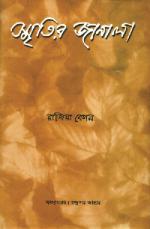
|
<%-- Page Title--%> Book Review <%-- End Page Title--%> |
||||||
|
<%-- Volume Number --%>
Vol 1 Num 144
<%-- End Volume Number --%>
|
|
March 5, 2004 |
|||||
|
<%-- Navigation Bar--%>
|
Rounaq Jahan Book
Review of 'Smritir Janala' by Razia Begum It is difficult to do a review of this book because its author is my mother, Razia Begum. An objective review is difficult because so much of my mother's memories are also a part of my own memory.
I call my mother's book "Memoirs of an Unknown Bangali Woman", borrowing the title of Nirod C. Chowdhury's famous book because my mother's book also depicts the life and time of a woman who has witnessed tremendous social and political changes and has noted her reaction to these changes. I am sure many women of her generation will be able to relate to the book because their lives were also very similar to hers. The book is divided into 7 chapters. Chapter 1, which is the longest, depicts her childhood in Noakhali. Though she was married at 14, it is surprising how close she has always felt to her natal family and how vividly she could recollect events of her childhood. Of course, like all childhood recollections, she remembers only the good things. Chapter 2 describes her marriage and the start of her family life in Burdwan with my father and first child (my sister Roushan). She records the marriage rituals practiced in those days in Noakhali, and also her encounter with city life. Chapter 3 describes her life in Bankura (where I was born) and where for the first time she saw Shantals. Chapter 4 highlights her stay in Medinipur (formerly known as Midnapore), the communal riots of 1947 and the ready help she and her family received from the Hindu colleagues and friends. Chapters 5 and 6, which are relatively brief chapters describe her life after Pakistan when she spent time in Comilla, Bagerhat and Bhola with my father. The last chapter describes her life in Munshiganj, Narayanganj and Dhaka (1956-'71). The editor has done an excellent job in organising the book in various chapters chronologically so that the readers get a sense of an evolving life and time. The flashbacks and flash forwards mesh quite well. A first time author in her eighties , Razia Begumís writing style is fluid and clear and it is an exceedingly readable book. Though most of the events describe what had happened to her and her extended family, the readers get a flavour of not simply the life of a woman or a family, but how society had changed tremendously over the last seventy years. As she notes in her preface, I encouraged her to write this memoir (because she is a natural writer) and I am very pleased that she did write and publish it. I will urge other women to write their memories too because through these memories we will be able to get a true picture of women's lives. I hope the book will be a good source book for women writing about women's histories in Bangladesh. Rounaq Jahan is a Senior Researcher, Southern Asian Institute, Columbia University, US.
|
||||||
 Though
my mother has been writing her memoirs during her spare time in the
last few years in all kinds of make shift places when she was visiting
her children in the US, I had never actually read her manuscript though
she wrote the bulk of it in my New York apartment. When I read the book
it came as such a pleasant surprise! For the first time I could see
my mother's life unfold before me as a carefree young girl growing up
in an affluent village home in Noakhali, as a young bride and mother
setting out to start a family life in West Bengal, and her exposure
to her husband's (my father's). The book also describes colleagues and
friends, many of whom were Hindus, her struggle to raise six children
on a limited income of an idealistic husband, who though was a high
government official never engaged in corruption to augment his fixed
salary, her practical instinct to build a home of her own, (which served
her and her children well later) and her utter devastation when her
husband died prematurely in 1971. Indeed as she points out, she started
writing only after her husband died because she somehow needed a way
to express her grief, feelings and emotions.
Though
my mother has been writing her memoirs during her spare time in the
last few years in all kinds of make shift places when she was visiting
her children in the US, I had never actually read her manuscript though
she wrote the bulk of it in my New York apartment. When I read the book
it came as such a pleasant surprise! For the first time I could see
my mother's life unfold before me as a carefree young girl growing up
in an affluent village home in Noakhali, as a young bride and mother
setting out to start a family life in West Bengal, and her exposure
to her husband's (my father's). The book also describes colleagues and
friends, many of whom were Hindus, her struggle to raise six children
on a limited income of an idealistic husband, who though was a high
government official never engaged in corruption to augment his fixed
salary, her practical instinct to build a home of her own, (which served
her and her children well later) and her utter devastation when her
husband died prematurely in 1971. Indeed as she points out, she started
writing only after her husband died because she somehow needed a way
to express her grief, feelings and emotions.